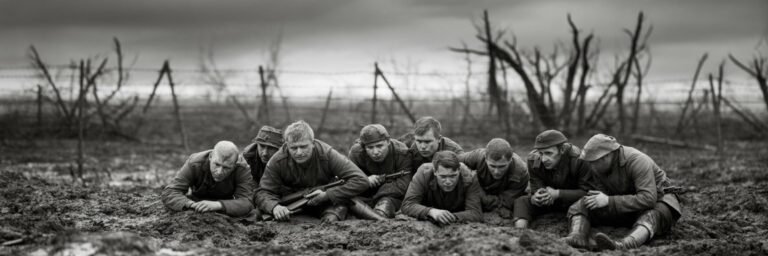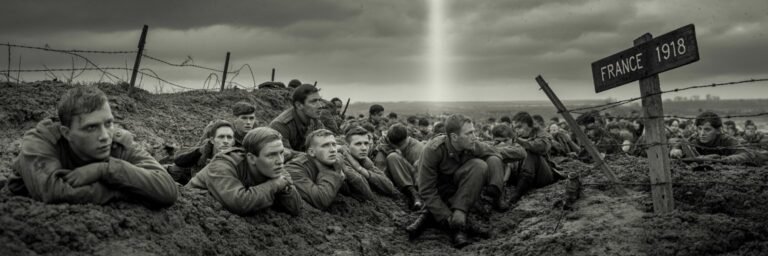World War I is often remembered for its major battles, such as the Battle of the Somme, Verdun, and Gallipoli. However, many lesser-known battles played crucial roles in shaping the outcome of the war and influencing modern warfare. These forgotten battles saw innovation, strategic brilliance, and immense sacrifice, yet they are rarely discussed in mainstream history.
This article explores some of the forgotten battles of World War I that had a lasting impact on the war and the world.
1. The Battle of Tannenberg (1914) – Germany’s Decisive Victory on the Eastern Front
While much attention is given to the Western Front, the Eastern Front saw its own share of significant battles. One of the most crucial was the Battle of Tannenberg, fought between the German Empire and the Russian Army in August 1914.
Why It Mattered:
- Germany, despite being outnumbered, decisively crushed the Russian Second Army.
- German commanders Paul von Hindenburg and Erich Ludendorff used superior railway logistics and encirclement tactics to annihilate the Russians.
- The battle weakened Russian morale and set the stage for Germany’s dominance in the East.
2. The Battle of Caporetto (1917) – A Devastating Defeat for Italy
One of the most dramatic battles of World War I, Caporetto (October–November 1917), saw Austro-Hungarian and German forces break through Italian lines in a stunning offensive.
Why It Mattered:
- Germany introduced infiltration tactics, allowing stormtroopers to bypass Italian strongpoints and penetrate deep into enemy territory.
- The Italian army collapsed, retreating over 100 kilometers and suffering over 300,000 casualties.
- The battle led to the appointment of General Armando Diaz, who reorganized Italian forces and eventually led them to victory at the Battle of Vittorio Veneto (1918).
3. The Battle of Lake Naroch (1916) – A Costly Russian Disaster
While meant to relieve pressure on the Western Front, the Russian offensive at Lake Naroch (March 1916) ended in disaster.
Why It Mattered:
- The Russians launched an ill-planned attack against German forces in present-day Belarus.
- Poor coordination and muddy terrain led to massive Russian casualties, with little gain.
- This failure further damaged Russian morale, weakening the Tsar’s government and contributing to the Russian Revolution (1917).
4. The Battle of the Isonzo (1915–1917) – Italy’s Forgotten Front
The Isonzo Campaign consisted of twelve battles fought between Italy and Austria-Hungary along the Isonzo River. Despite heavy losses, these battles were crucial in determining the fate of the Italian Front.
Why It Mattered:
- Italy launched repeated frontal assaults on Austrian positions, suffering massive casualties.
- These battles showcased mountain warfare, with soldiers fighting in extreme conditions.
- The twelfth battle (Caporetto) saw the worst Italian defeat, but it ultimately forced Italy to modernize its military tactics.
5. The Battle of the Vosges (1914–1915) – The Forgotten Alpine War
While the Western Front is known for its trench warfare, few remember the brutal mountain battles in the Vosges region of France.
Why It Mattered:
- French and German forces fought in harsh winter conditions, leading to severe casualties.
- The battle saw early use of camouflage and mountain warfare tactics, influencing later conflicts.
- Despite its importance, the Vosges campaign remains overshadowed by larger Western Front battles.
6. The Battle of Le Cateau (1914) – The British Army’s Heroic Stand
Fought on August 26, 1914, the Battle of Le Cateau was one of the first major engagements for the British Expeditionary Force (BEF) in World War I.
Why It Mattered:
- The British fought a delaying action, allowing their forces to retreat in good order.
- Despite being heavily outnumbered by the Germans, the BEF’s disciplined rifle fire inflicted heavy casualties.
- This battle set the tone for trench warfare, proving that rapid-firing infantry could hold off numerically superior forces.
7. The Battle of Megiddo (1918) – The Final Blow to the Ottoman Empire
The Middle Eastern Front is often overlooked in World War I history, but the Battle of Megiddo (September 1918) was a decisive victory for the Allied forces against the Ottoman Empire.
Why It Mattered:
- British General Edmund Allenby used deception and mobile warfare to encircle Ottoman forces.
- The battle led to the collapse of the Ottoman front, paving the way for the fall of Damascus and Aleppo.
- It signaled the final days of the Ottoman Empire, which would be dismantled after the war.
The Lasting Impact of These Forgotten Battles
While not as famous as the Battle of the Somme or Verdun, these battles played critical roles in shaping World War I. They showcased new tactics, technological innovations, and the resilience of soldiers fighting in brutal conditions.
Key Takeaways:
- The Battle of Tannenberg demonstrated the power of logistics and maneuver warfare.
- Caporetto and Lake Naroch highlighted the importance of leadership and planning.
- The Battle of Megiddo and the Middle Eastern campaigns helped redraw the map of the modern Middle East.
- The Isonzo battles and Vosges conflict showcased the extreme challenges of terrain-based warfare.
These battles may not be household names, but they changed the course of history. By studying them, we gain a deeper understanding of the complexities and consequences of World War I.
Why Remember These Battles?
History often focuses on major battles, but the forgotten battles of World War I offer valuable lessons on strategy, innovation, and the human cost of war. These conflicts remind us that every front mattered, every soldier’s sacrifice counted, and every decision shaped the world we live in today.
By remembering these battles, we honor those who fought and ensure their stories are not lost to time.






